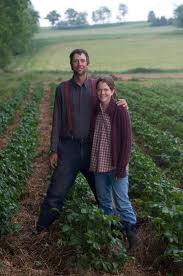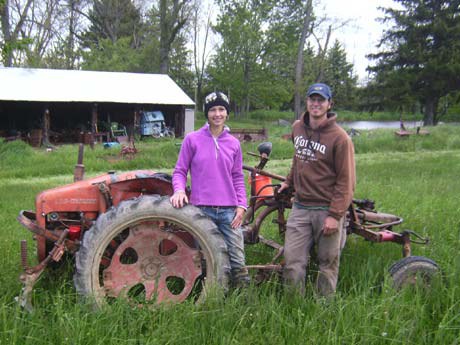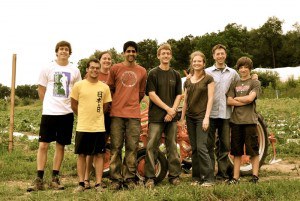Tips from central PA CSA farmers: Marketing, Budgeting and Pricing, Packing and Distribution, Production and Labor
Community Supported Agriculture (CSA) is a production and marketing system that allows small farmers to maximize income and reduce risk. It provides the farmer with up-front income to cover at least the variable expenses of producing the crops.
In a CSA, customers pre-purchase a share of the season's crop. The farmer receives payment for the share before the season begins so he/she is able to cover startup costs. CSA customers benefit as well--they enjoy farm-fresh food throughout the season as they share the risks and rewards of the harvest.
CSAs originated on small, diversified organic vegetable farms growing vegetables, herbs, flowers, and fruit. Now, however, the concept has expanded to include other farm products including meat, eggs, dairy products, and even baked goods in their shares. 
PA-WAgN hosted a Community Supported Agriculture Workshop at Plowshare Produce in Huntingdon County. The workshop was attended by many local CSA farmers. At the workshop we toured the beautiful Plowshare farm and then gathered over lunch to share information about:
- Marketing
- Budgeting and Pricing
- Packing and Distribution
- Production Labor
CSA Farmer Tips
CSA farmers attending the event shared tips that have helped them improve the profitability of their businesses. These tips--arranged in the categories of marketing, pricing, production, distribution, and labor--are elaborated below.
Production
- When planning production, work backwards. "We created a spreadsheet and planned box contents. Then we worked backward to create a seeding chart. Then we added up the square feet of rows required to meet our needs."
- Adding other products to your produce has become increasingly important--eggs, pastured chicken, bread, canned produce, honey, etc.--which may be produced on neighboring farms. Some CSAs have a goal of becoming a "full-diet" farm.
- High tunnels are great. "We raise a significant amount of our early and late produce in a high tunnel. We use electric heat mats for starting seeds and horse manure beds on an inside chamber in the hoophouse to generate heat."
- Start seeds inside your house or in the basement under grow lights and move them to the high tunnel later to reduce your need for supplemental heat.
Labor
- Get to know your potential work-share members well. "Diversity is good; we have work share members who are men, women, young and old--some who are 16 and some who are 60."
- Look for interns at the Pennsylvania Association of Sustainable Agriculture (PASA) website: www.pasafarming.org. You can also look at Willing Workers on Organic Farms (www.wwoofers.org)
- Check out labor laws and be sure you are in compliance with pay and workman's compensation.
Marketing
- Developing a nice farm brochure is critical for marketing your business. Many layout programs are so simple that you can do this yourself, even if you are not particularly computer savvy.
- Collaborate with other farmers to offer a wider variety of products than you can produce yourself, such as bread, eggs, meat, honey, jams, fruit, and canned goods.
- List your farm on www.localharvest.com for free, wide-spread exposure. Buy Fresh, Buy Local programs are also good ways to reach customers.
- Place brochures in surrounding businesses especially health-related businesses like gyms, health clubs, chiropractors' offices, and hospitals. Other possibilities are brew pubs, coffee houses, day care centers, etc.
- Donate baskets to benefit auctions or give away coupons for free shares.
- Put up posters and re-poster every week. "Posters alone gave us half of our memberships. We put tear-off strips up directing folks to our web site."
- Hold community meetings every year to publicize your farm and the benefits of CSA. "We show a powerpoint with lots of photos. The people who came to these became our core members."
Pricing
- Determine whether you'll offer just full shares (usually for a family of 4) or half shares as well. Farmers who want to offer half shares don't have to offer a small share every week. Instead, offer a full share every other week.
- Consider that most people do not join CSAs to save money on groceries. Most join for the other benefits, including access to the freshest, probably organic, produce; the opportunity to help preserve farmland and farmers; keeping money within the local economy; etc.
- In 2011, vegetable share prices seemed to be based on $22-30+ per week. If other items are included, prices could be higher.
- More farmers markets and CSAs are seeking to accept Farmer's Market Nutrition Coupons and SNAP (Food Stamp) benefits. For example, the Eastern Farmers' Market accepts SNAP cards and gives customers wooden coins that they can use at each vendor.
- Have present members renew from November until February, and then open up membership to others. "We allow everyone to hold their share with a $50 deposit as long as they are paid in full by May 1."
Distribution
- If you plan on delivery, drop off shares at several indoor locations. "It's easier and more efficient for us to take crates of produce and provide a list so our customers can pick their own items."
- Have a monitor during pick-ups to keep the items stocked, hand out newsletters, keep an eye on the kids, and talk to customers. This saves the farmer enormous amounts of time. When there are no customers, the monitor can cut up garlic or do other small jobs.
Packaging
- Before the season starts, order your bags and boxes for the entire year. "We get bags and boxes from Tuscarora Organic Cooperative (TOG). We also buy some things from Lewistown Paper Company, including ½ lb. Ziploc bags."
- Use white butcher paper rolled into cones for greens and flowers. Use wooden crates to pack produce and have customers choose their vegetables and their own bags. Or give customers reusable waxed boxes.
Joshua Farm: Farming in the City
Kristin Reinford from Joshua Farm in Harrisburg described her urban farm's work as a mission to provide healthy food to her low-income neighborhood and education for at-risk youth. The farm, one-acre lot leased from the Harrisburg School District, is a program of the non-profit Joshua Group. At Joshua Farm, inner-city kids learn to produce and market vegetables through the CSA program and at a farm stand. The farm sells 50 CSA shares a season and collaborates with other local producers to provide vegetables, fruits, flowers, and herbs to its customers.
Lower prices at the farmstand help inner-city residents afford fresh produce within walking distance of their homes, To meet their needs, the farm accepts SNAP (food stamp) benefits and Farmers Market Nutrition Program vouchers. Recently Capital RC&D funded a card reader so that the Joshua Farmstand can accept SNAP benefits and bank debit cards.
(For more information on this, see the farm blog).
Tait Farm: Staying the Course
Erin McKinney from Tait Farm 's Community Harvest CSA explained that her CSA  offers half-year and full-year shares of certified organic produce, including year-round greens and cold-hardy vegetables grown in high tunnels over the winter.
offers half-year and full-year shares of certified organic produce, including year-round greens and cold-hardy vegetables grown in high tunnels over the winter.
The farm, located near Penn State University with an urban and relatively affluent customer base, has little trouble filling its 200 CSA shares. "Our CSA, which was one of the first in our area, provides our farm with a reliable source of income. Over the last 12 years, the CSA has gotten more cachet and shares are very popular."
"In a community like ours," Erin said, "folks are educated about the value of buying locally, eating health local food, and purchasing organic foods. They are also seeking a connection with the earth, with the farms and farmland surrounding their homes. That knowledge will support the CSA movement far into the future."
 Greenmoore Gardens: Seeking Collaboration
Greenmoore Gardens: Seeking Collaboration
Greenmoore Gardens is another new CSA farm. Farm manager Sunil Patel has been farming there for 3 years. During that time, he increased the size of the CSA and is planning to eventually add poultry and perhaps hogs to the operation. The CSA, which is located between Port Matilda and State College, seeks interns every year and also offers work shares.
Sunil sees a growing importance in collaborating with other farmers to offer new products to their customers. "We're sourcing pastured chickens from another and fruit from a local orchard. We hope that by offering a greater selection, we'll keep our members happy. It's also a great way to build community among the local farming community."
Village Acres: Managing Labor
Village Acres is one of the area's oldest CSAs. The farm, located in Mifflintown has delivered CSA shares to State College, Burnham, and Selinsgrove for 13 years. This certified organic farm is operated by Roy and Hope Brubaker and their family. Their long years of experience provide a wonderful guide for new farmers, particularly in the case of labor management. "We couldn't manage our CSA, with all the growing, picking, washing, packing, and delivery without the help of a lot of good people," said farm manager "Our farm employs both interns and hourly workers."
"But it's important to know the law. Even if all your interns are happy, don't assume you are safe from a Department of Labor audit. We were audited by the Department of Labor unexpectedly. They appeared unannounced and asked to interview interns for 6 hours during the height of the growing season. Fortunately we were in compliance with the law, which means we devoted to time teaching about farming; our interns were students at accredited schools or they were being paid minimum wage; and we carried workman's compensation when interns were earning more than $600. We were allowed to substitute room and board for minimum wage."
Pennsylvania Women's Agricultural Network
Address
302 Armsby BuildingUniversity Park, PA 16802
- Email pawagn@psu.edu
Pennsylvania Women's Agricultural Network
Address
302 Armsby BuildingUniversity Park, PA 16802
- Email pawagn@psu.edu

